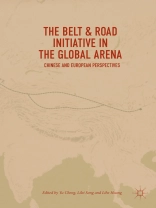This book is among the first to systematically analyze and discuss the Chinese government’s“One Belt, One Road” initiative to promote infrastructure investment and economic development, bringing together a diverse range of scholars from China, Russia, and Eastern Europe. The book assembles a package of next generation ideas for the patterns of regional trade, investment, infrastructure development, or next steps for the promotion of enhanced policy coordination across the Eurasian continent and strategic implications for EU, Russia and other major powers, introducing innovative ideas about what these countries across belt and road can do together in the eyes of the young generation. This book will be of interest to scholars, economists, and interested observers of the international impact of Chinese development.
Table of Content
1. Public Opinions on the Belt and Road Initiative: A Cross-cultural Study.- 2. China’s Belt and Road Initiative – Connecting and Transforming Initiative.- 3.Intercultural Education on the Theme of the Belt & Road Initiative: A Multimodality-oriented Pedagogical Design.- 4. A Model for the Belt and Road Initiative: China’s Cultural diplomacy toward Central & Eastern European Countries.- 5. One Belt, One Road – Connecting China with Central and Eastern Europe?.- 6. Determinants and directions of Polish-Chinese cooperation in the context of the “One Belt – One Road” initiative.- 7. One Belt, One Road: A comparative regionalism approach.- 8. The Political Economics of the New Silk Road.- 9. Sub-national development policy as the area of common interest under the “One Belt, One Road” Initiative? The case of regional policy-making in Poland.- 10. A Comparative Study of Labor Market for Distant High Profile Specialists between China and Russia.- 11. China-Europe Investment Cooperation: A Digital Silk Road.- 12. One Belt, One Road and Central Asia: challenges and opportunities.- 13. Is Afghanistan in the way or on the way of the New Silk Road?.- 14. China in Central Asia and the Balkans: Challenges from Geopolitical Perspective.
About the author
Yu Cheng is Associate Professor of the International School of Tongji, China. She is also the Director of International Curriculum Program of the international school and Deputy Director of the Liaison Office of the Confucius Institutes of Tongji University.
Lilei Song is Associate Professor at the Institute of Central and Eastern Europe Studies, Tongji University, China. She is a member of the council of the Shanghai Institute for European Studies and an Assistant Secretary General of the Shanghai Institute for Russia, Eastern Europe and Central Asia.
Lihe Huang is Lecturer and Deputy Head of English Department at Tongji University, China. He has published widely in linguistics and higher education, and undertaken several research projects granted by different institutions. He is a Humboldt Fellow of the Germany-based Alexander von Humboldt Foundation.












